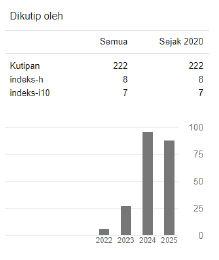The Utilization of SQ3R Method to Enhance English Reading Skills: Students’ Voices in The Indonesian Higher Education Context
 https://doi.org/10.54012/ijcer.v2i1.175
https://doi.org/10.54012/ijcer.v2i1.175
 Abstract views: 1126
Abstract views: 1126
 PDF downloads: 883
PDF downloads: 883
Keywords:
English Reading Skills, SQ3R, Students’ Voices, Indonesian Higher EducationAbstract
The problem mostly experienced by EFL students is the assumption of difficulty in reading English texts. Thus educators are always looking for the best teaching approach methods to develop skills, especially in reading skills. The present study mainly describes the students’ voices about using SQ3R in improving reading skills in the Indonesian higher education context. This study belongs to a descriptive qualitative study. Data were gathered through observation and interviews with students. The results of the study demonstrate that most students believe that the existence of the SQ3R method can have an impact on the learning process of students. It has benefits including improving students' reading comprehension skills, increasing high curiosity, and being able to provide experiences of understanding discourse more easily.
Downloads
References
S. Wahyuningsih and R. D. Susanti, “Meningkatkan kemampuan bahasa inggris calon guru madrasah ibtidaiyyah di era revolusi industri 4.0 melalui project-based learning. Elementary,” Islamic Teacher Journal, vol. 8, no. 1, pp. 1–18, 2020, doi: 10.21043/elementary.v8i1.6384.
A. Biringkanae, “The use of SQ3R technique in improving students’ reading comprehension,” ELS Journal on Interdisciplinary Studies in Humanities, vol. 1, no. 2, pp. 218-225, 2018, doi: 10.34050/els-jish.v1i2.4316.
N. Aksan, and B. Kisac, “A descriptive study: reading comprehension and cognitive awareness skills,” Procedia Social and Behavioral Sciences, vol. 1, no. 1, pp. 834–837, 2009, doi: 10.1016/j.sbspro.2009.01.149.
S. Wahyuningsih and M. Afandi, “Investigating English speaking problems: Implications for speaking curriculum development in Indonesia,” European Journal of Educational Research, vol. 9, no. 3, pp. 967–977, 2020, doi: 10.12973/EU-JER.9.3.967.
S. Wahyuningsih, “Teaching english through e-learning during the covid-19 outbreak: english teachers’ perspectives at indonesian junior high schools,” in International Conference on Teacher Training and Education, Aug. 2021, pp. 101–109.
S. N. L. Hussin and A. A. Aziz, “Rethinking the teaching approaches of esl/efl writting skills,” International Journal of Academic Research in Progressive Education and Development, vol. 11, no. 1, pp. 1044-1054, 2022, doi: 10.6007/IJARPED/v11-i1/12174.
M. Bojovic, “Reading skills and reading comprehension in English for specific purposes,” in the International Language Conference on the Importance of Learning Professional Foreign Languages for Communication between Cultures, Sept. 2010, pp. 1-5.
R. Ahmadi, Metodologi Penelitian Kualitatif. Yogyakarta: Ar-Ruzz Media, 2014.
H. Darmadi, Metode penelitian Pendidikan dan Sosial. Bandung: Alfabeta, 2013.
Y. Hidayat, A. Herniawati, and N. Ihsanda, “The use of drilling technique to teach English speaking to the early childhoods: a descriptive study,” Journal Corner of Education, Linguistics, and Literature, vol. 2, no. 1, pp. 73–80, 2022, doi: 10.54012/jcell.v2i1.66.
Student 1. (2022). Interview.
Student 2. (2022). Interview.
Student 3. (2022). Interview.
Downloads
Published
How to Cite
Issue
Section
License
Copyright (c) 2023 Sri Wahyuningsih, Putri Nafisah, Nono Mulyono, Yusuf Hidayat

This work is licensed under a Creative Commons Attribution-ShareAlike 4.0 International License.









